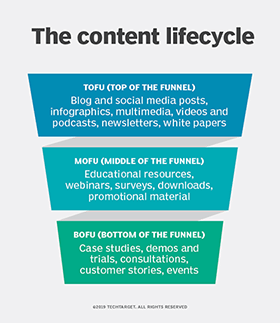What roles are essential on a content marketing team? (original) (raw)
There are a number of people involved in business content marketing teams. Some of those roles include content managers, content strategists and content creators.
By
- Sarah Amsler,
- Scott Robinson, New Era Technology
Published: 08 Jul 2020
The content marketing team is an essential component of any business's marketing department.
Content marketing is the practice of publishing materials to promote a business but in a subtler way than traditional advertising. The content marketing team handles all aspects of content -- everything from creation to deployment -- but it takes a number of dedicated people to make the entire content lifecycle work at peak performance.
Here are some roles that businesses should consider including on their content marketing teams.
Chief content officer. This newcomer to the C-suite thinks like a publisher, leading content marketing efforts and overseeing all content that a company creates to ensure it follows the company's mission, content strategy and brand message. The chief content officer usually reports to the CEO and is generally the liaison among public relations, marketing, customer service and executive leadership.
Chief marketing officer (CMO). This C-suite role works closely with the chief content officer and thinks more like a salesperson, with a goal of attracting and retaining customers. In the absence of a chief content officer, the CMO takes the lead in content marketing efforts.
Content managers. Content managers do more than just coordinate team efforts. In fact, there are a number of managerial roles that fall into this category, including the following:

- Technical content manager. This is the expert responsible for overseeing technology aspects of content management, including content management systems, digital asset management systems and web analytics.
- Managing editor. This is the internal project manager who oversees everyday editorial operations and is responsible for creating an editorial calendar, managing production flow and improving content processes.
- Subject matter expert manager. This is the person responsible for developing and maintaining relationships with freelancers, contributors and influencers.
- Social media manager. This is the person responsible for overseeing social media accounts, such as Facebook, Twitter, LinkedIn and Instagram. Duties include creating social media posts, moderating discussion and responding to customer comments.
Content strategist. The strategist is responsible for many tasks: establishing specific goals for content deployment, which should happen in the context of understanding what competitors are doing; incorporating and monitoring brands for consistency and effectiveness; and implementing and overseeing schedules that coordinate the content lifecycle with the business needs. This position also supervises the development of personas -- customer models based on marketing data to understand customer behaviors and motivations.
Search engine optimization (SEO) strategist. SEO is an important component of any content marketing strategy. SEO experts are tasked with the responsibility of getting the right content in front of their target audience. They do this by tracking trends to see what people are searching for on the web, strategically placing keywords into articles and creating quality links throughout the content.
Content creators. In most organizations, there are multiple people involved in the content creation process. These creators include content writers, videographers, graphic designers, composers and photographers, all of whom are necessary to create high-quality, compelling content. Marketing teams work with a variety of written content, audio content and visual content, including articles, graphic design, photography, video content, sound effects and music.
Content editor. Ensuring content quality is a rigorous task, as professionalism rules in content presentation. Included among the editor's skills are the ability to coach content creators in revising their work, reviewing content for errors and accuracy, and offering new topics and design approaches as needed.
Content curator. Separate from a content creator, this person uses curation best practices to scour the internet for relevant, already published information to share on blogs and social media, supplementing the efforts of the content creation team.
Content analyst. Last in the list of content team roles is the content analyst. This person does not need to be a full-time member of the team. However, the tasks in this role are highly specialized and include gathering content analytics and viewer browser behaviors; monitoring content and measuring its effectiveness throughout its lifecycle; and reporting all of this to the team and stakeholders.
It's important to note that the content marketing team should always be evolving. While a business may begin the team with certain roles in mind, it may require different specialists down the road.
Dig Deeper on CRM tools and strategy
-
 What is a content management system (CMS)?
What is a content management system (CMS)?  By: Scott Robinson
By: Scott Robinson -
 Document management vs. content management: How they differ
Document management vs. content management: How they differ  By: Erica Mixon
By: Erica Mixon -
 web content management system (WCMS)
web content management system (WCMS)  By: Scott Robinson
By: Scott Robinson -
 Generative AI's effect on content management systems
Generative AI's effect on content management systems  By: Robert Peledie
By: Robert Peledie
Related Q&A from Sarah Amsler
What is the role of a customer relationship manager?
The customer relationship manager -- a role that differs from a CRM manager -- has a challenging and ever-evolving role to play when it comes to ...Continue Reading
What is information management vs. knowledge management?
There are some subtle differences between information management and knowledge management -- one focuses on processes while the other focuses on ...Continue Reading
What's the difference between CRM and database marketing?
Database marketing is a component of customer relationship management. CRM includes all processes, strategies and tools to support sales, marketing ...Continue Reading